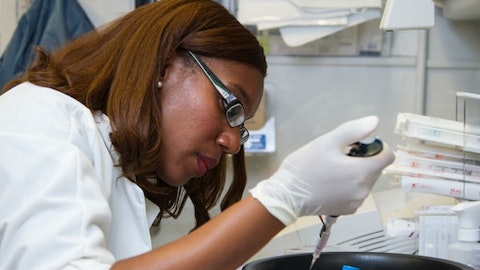Charles Ferranti: Hi, everyone. This is Charlie on for Chris. Thanks so much for taking our questions. Congrats on the progress as well. Just couple of quick ones from us. First, on the NKTR-255 plans for strategic partnership. Wondering if there’s any update on the expected time line for that partnership? I know year-end ’23 was the previous target, I’m wondering if that was still the case or if we had a new time line in mind at this point? And then on the subsequent pipeline with the TNFR2 IND coming next year, wondering if there’s any update on the PEG-CSF1 program and whether we should expect an IND from that program more on the 2025 sort of scale? Thank you.
Jennifer Ruddock: So I’m going to have Howard take the first part of that question on NKTR-255. And then JZ, will you take the question on the preclinical program.
Howard Robin: So, yes, sure. Good question. Look, NKTR-255 is a potentially very exciting program. We’re talking to a number of companies. You see that we just completed a collaboration with CBMG in combination with TIL therapy, we have a collaboration with Merck KGaA in bladder cancer. So there’s a lot going on with NKTR-255. We also have our own study running at the Fred Hutchinson Cancer Center in cell therapy. So there are companies that are interested. I think as — we would like to complete a strategic collaboration for NKTR-255. Our focus as a company is in immunology now, although I think this is a very exciting asset. And I can’t give you specifics as to when and how a collaboration will get done, but we’re making great progress there.
And as you can see with the CBMG collaboration, we’ve just added another exciting potential application for NKTR-255. So we’ll keep you posted. I don’t know that it’s going to be end of this year or next year, can’t say for sure. But clearly, we’re focused on that, and I do think it will get done. JZ, would you handle the PEG-CSF1 question?
Jonathan Zalevsky: Certainly. Yes. Thanks for the question. So at this time, we’ve really prioritized our efforts on the TNFR2 program and that’s really for a couple of reasons. The first is that TNFR2 builds on a complementary pathway around Treg targeting that’s distinct from the IL-2 pathway that REZPEG engages. So, for example, you know that TNFR2 as a TNF superfamily member is really one of the strongest signals that induces NF-kappa B thin cells like Tregs, and it’s also one of the strongest signals for controlling FoxP3 expression, which is a critical enzyme for both suppressive and differentiated and strong Treg responses, right? The loss of FoxP3 causes de-differentiation of Tregs. So it’s really a target that’s very, very hot at this time.
It’s really built off of what we know and have learned through our deep experience with REZPEG and the Treg field. And it also lets us leverage all that knowledge and advance our prioritized efforts into TNFR2. And so that’s where we’re really focused at this time. The PEG-CSF program, we will work on in the future, but it’s really TNFR2 where we’re focused on right now. I’ll also say that as we’ve had the opportunity to discuss that program with some other outside entities, we have received a lot of interest around the program. We’re finding many companies like pharmas and large biotechs and others that have really allocated time for TNFR2 into their strategy. So much is known around TNF inhibition with drugs like HUMIRA, golimumab, infliximab, Enbrel and so on that have had such a profound effect on rheumatology.
And through that period of time, we’ve understood about the TNFR1, TNFR2 receptor access and what’s missing, when you just block all TNFRs, the signaling, which includes also blocking the TNFR2 pathway. So this is something that we’re very excited about. We like all of the interest and where we’re really prioritizing our energy. We’re very excited that we’re on track. We’re moving into our cell line stage, paving into the manufacturing setting. And we’re on track to be submitting our IND next year in 2024 for that program.




